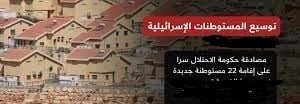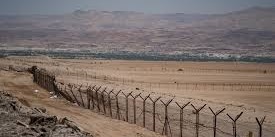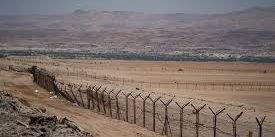By: Madeeha Al-A’raj
The national Bureau for Defending Land and Resisting Settlements stated in its latest weekly report , that US presidential elections that took place on Nov. 5, in which Donald Trump won a landslide victory, thecelebrations in Israel were widespread among its parties in general, and the settlers in particular, becausetheir stakes on the US Administration are high, regardless of the complexities of the regional and the international situations, and the options of the new administration in dealing with them. The current situation in the region in particular is complex, and the US president-elect believes that this situation should not distract his administration from focusing on the most important challenge to the United States on the international stage, the US economy and the competitive relationship with China.
In his victory speech, Trump tackled 3 issues that occupy the attention of the new administration, namely: putting an end to the war in Gaza and Lebanon and the field arrangements that accompany that, and the relationship with the active axes in the region, including of course the so-called Iranian axis, and opening a political horizon for the Palestinian-Israeli conflict and not being dragged as much as possible into a direct confrontation with Iran and the so-called Iranian axis, and its involvement in a war in the region, at a time when it announces that its policy is based on closing the war files.
What do the parties of the ruling fascist coalition and the settlers leader in Israel in general, and the parties in particular base their calculations on such celebration of the success of Trump in the US presidential elections? There is no doubt that the experience of US-Israeli relations during Trump’s first term in office plays an important role in this regard. There is a longing in Israel for the precious free gifts that he gave to Israel during his previous term in office: recognizing Jerusalem as the capital of the occupying state,transferring the US embassy from Tel Aviv to Jerusalem, the closure of the US consulate in the city, recognition of Israeli sovereignty over the occupied Syrian Golan, denial of international legitimacy decisions and recognition that settlements do not violate international law and legitimacy, and the Abraham Accords and what they constituted of a deep penetration i.e. ‘Devrosoir’ of the so-called Arab Peace Initiative, in addition to the umbrella ofpolitical and diplomatic protection in international forums, which reached the extent of the US withdrawal from UNESCO to appease Israel.
This longing was blatantly expressed among the settlers and their leaders during the election campaign, especially since settlement construction during Trump’s first term had increased by about 250% compared to President Barack Obama’s second term, the number of construction tenders in the settlements had doubled, at least 31 random settlement outposts had been established, and unprecedented construction plans had been advanced, including a plan to build a settlement in the Area E1 area, east of occupied Jerusalem, which would sever the geographical connection between the northern and southern West Bank, and much more. That is why the involvement of the settlers and their leaders in supporting Trump’s campaign to win the presidency was multifaceted. From Talmudic prayers to direct interference in the elections. A significant number of settler leaders performed Talmudic prayers during the election campaign near the Ibrahimi Mosque in the city of Hebron, in the hope that US President Trump would win a new presidential term.
Settler leaders held a special prayer meeting outside the Tomb of the Patriarchs, thanking Trump for his support of the settlement movement and wishing him success in the elections. Psalms and other prayers were recited to help him win, with Har Hebron Regional Council Chairman Yochai Damri and Republicans Abroad Israel chairman Mark Zell blowing the shofar to show support for Donald Trump. Gush Etzion Regional Council Chairman Shlomo Neeman and the so-called Hebron Mayor Rabbi Hillel Horowitz also took part in the prayer meeting for Trump’s reelection.
The MK Yossi Dagan, FROM Likud Party, and head of the Regional Council for Settlements in the northern West Bank, was also active in the Trump campaign. Dagan, who called for the burning of the Hawara town in late February, helped the election promotion center GVOT, which spoke to Jews in America who might vote for Trump. In a conversation with the Israeli newspaper Haaretz after the results were in, Dagan was very pleased with the results and said, “A great yoke has been lifted from us. A heavy burden has been lifted from us. American pressure has affected everything, in the security and the settlement spheres. I believe that this pressure will stop or weaken.”
Dagan toured the United States during the election campaign, and among his activities was a speech he gave in Pennsylvania in which he said, “If people want to help the pioneers who live in Judea and Samaria i.e. ‘West Bank’, they should vote for Donald Trump.” Republican Party leaders are considering, according to Israeli media, inviting Dagan to attend Trump’s inauguration ceremony on January 20, as a reward for his efforts in supporting Donald Trump’s campaign.
A very prominent supporter of settlements during Trump’s first term and a close friend of Yossi Dagan and settler leaders is David Friedman, who served as US ambassador to Israel during Trump’s first term. Friedman recently announced the release of a new book titled “One Jewish State” from the settlement of Nofim, located on the lands of the Deirstiya town in the Salfeet Governorate. The book launch event at the Israeli publishing house “Sela Meir” was attended by 6 ministers namely: Yisrael Katz, Nir Barkat, Eli Cohen, Amichai Shkli, Orit Struck and Gila Gamliel. In a film promoting the book, Friedman explained his vision of a Jewish state that would also impose its sovereignty on the West Bank. Adding, “We hope that one day, with God’s help, Israel will have Jewish sovereignty over all of our biblical homeland.”
That was the atmosphere in Israel among the settlers, their regional councils, their leaderships and their settlement associations, overall, based on a poll conducted by Channel 12 Israel before the US presidential election day, After the election results, everything came to the fore more clearly. Netanyahu was the first to congratulate President Donald Trump on his victory. Addressing him in a language that was not devoid of hypocrisy and deceit, hesaid,“Congratulations on the greatest comeback in history!! Your historic return to the White House represents a new beginning for the American people, as well as a renewed commitment to the great alliance between Israel and America. This is a great victory.” Those close to Netanyahu said that he intends to put the annexation issue back on his government’s agenda after Trump takes office on January 20. They point out that these annexation plans already exist and include detailed maps and orders to expand settlements through pre-prepared government decisions.
For his part, head of the Religious Zionism Party, Minister of Finance and Minister of Settlement in the Ministry of Army, Bezalel Smotrich celebrated Donald Trump’s victory in the US presidential elections during a meeting of his party’s faction in the Knesset last Monday. This victory brings with it an important opportunity for the State of Israel, which was one step away from imposing sovereignty over the settlements in Judea and Samaria ‘the West Bank’ during Trump’s previous term, and now the time has come to implement it, according to him, as “there is now broad consensus in the coalition and the opposition from all parts of the Knesset to oppose the establishment of a Palestinian state, which poses a threat to the existence of Israel.”
He considered that 2025 will be the year of sovereignty in the West Bank, and that he had instructed the Settlement Directorate in the Ministry of Army and the Civil Administration to begin comprehensive, professional collective work to prepare the infrastructure required to impose sovereignty.
Leader of the Otzma Yehudit Party, the fascist minister Itamar Ben-Gvir, a resident of the Kiryat Arba settlement, also called in a Knesset session last Wednesday, AS saying, “This is the time for sovereignty, the time for complete victory, the time here in the State of Israel to legislate a law for the death penalty for terrorists and many other laws that he said Trump would not oppose.”
Head of the “Yesha Council” of settlements, Yisrael Gantz, also celebrated Donald Trump’s victory in the US presidential elections by launching a new wine bearing the name Trump, at the Psagot Winery in the West Bank, on Nov. 6, 2024, and claimed that annexing the West Bank would bring stability and real peace to the region, while Beit El Mayor Shai Alon echoed that sentiment and said that the time has come for extensive and intensive construction in the area. Both expressed their desire to end the sanctions imposed by the Biden Administration on a limited number of extremist settlers and illegal outposts last year, which angered the settlement movement.
Settler leaders are pinning their hopes on Trump’s victory and recall his first term, during which the number of building permits in settlements and outposts jumped to record levels. They are waiting for him to get in the White House with, as Yedioth Ahronoth reports, a “clear agenda,” which includes expanding settlements by legalizing random outposts, implementing construction plans in the settlements, canceling the sanctions imposed by the Biden administration on a number of settlers and some settlement entities, annexing areas in the West Bank to Israel, and perhaps settling areas in the Gaza Strip.
Is this agenda applicable in the new era of Donald Trump? Comingdays will answer the question, but one can say that what is leaking about prominent potential candidates to hold important positions in the new administration in the State Department, the Washington Embassy in Tel Aviv, or the United Nations does not inspire optimism for the Palestinians, who in any case still have their national options in dealing with all possibilities.
On another level, the occupation authorities announced last Monday the seizure of hundreds of dunums of citizens’ lands northeast of Salfeet. They issued an “expropriation order” to seize 546 dunums of citizens’ lands in the villages of Yasouf, Marda, Kafel Haris and Jama’in, with the aim of expanding the so-called “Trans-Samaria 505” road, in the section from Kafel Haris to the Za’tara checkpoint, the intersection point between the aforementioned road and Road No. 60.
The lands that will be included in the seizure are Basin n. 6 in the areas of Khallet Ibn Ahmed, Al-Khirba, Al-Wajh Al-Qibli, Al-Ras, and Al-Duwair in Kafel Haris, and Basin n. 3 in the locations of Khallet Al-Kubra, Khallet Al-Lahm, Kafayef Asfour, Wadi Qasim, and Kafayef Al-Abhar in Marda, in addition to Basin n. 4 in the Al-Mala’b site. In Jama’in, Basin n. 2 in the Sha’b Al-Hariq site, and in Wadi Marda, Basin n.3 in the locations of Hariq Al-Aweel and Al-Khala. The decision also includes Basin n. 2 in the Khallet Al-Fula site in Hawara, and in Yasuf: Basin n. 2 in the Za’tara area, Basin n. 12 in the Jabal Abu Al-Suwaid site, and Basin n. 14 in the Al-Jafri site.
List of Israeli Assaults over the Last Week Documented by the National Bureau:
Jerusalem:
- Forcing citizen Moh’d Al-Awar from the Silwan town to demolish his own house after the occupation court rejected requests to obtain a license for the house located in the Al-Murooj area of the town.
- Bulldozing a mosque, an abandoned house, a guest house, and 5 sheep pens in the Arab Al-Ara’ra community near the town of Jaba, while settlers assaulted citizen Moh’d Issa with a sharp tool in a valley near his town of Um Tuba, south of occupied Jerusalem, seriously wounding him.
- Demolishing the house of citizen Naim Al-Ruwaidi in the town of Silwan, which also contains the headquarters of the Al-Bustan Center and the Al-Sumoud Tent, which is considered the place where the residents of the Al-Bustan Neighborhood have gathered for years to defend their homes.
- Burning 3 vehicles in the Sheikh Jarrah neighborhood, east of occupied Jerusalem.
Hebron:
- Destroying olive trees and cut a fence and water pipes owned by citizen Muhamad Musa Makhamreh, in the Igziwiya area. A group of settlers also stormed Khirbet al-Fakhit, and conducted provocative tours around the citizens’ homes. They raided the school of the village and toured its yards and corridors, before heading to the settlement outpost that was built on citizens’ lands in the ‘Halawa’ area near the village.
- Preventing citizens from picking olives and entering their lands in the Tel al-Rumaida area, while settlers destroyed four residential caravans and tin houses east of the town of Sa’ir after they stormed the houses and forced the families to leave them before vandalizing them and destroying their contents.
- Attacking Palestinian farmers in the eastern area of the Sa’ir town, where they stormed olive groves and stole their fruits.
- Demolishing the house of citizen Iyad Abdul Hamid Muhaisen Awad in the ‘Beit Za’na area’, east of the Beit Umar town under the pretext of not having a license, despite the fact that the owners of the house possessed all the legal papers proving their ownership of the land on which the building was built.
Bethlehem:
- Cutting down 70 olive, grape and almond trees in the Ein Fares area in the Nahalin town, west of Bethlehem, owned by Adel Ghayata. Others cut down about 40 trees of various types in the same area owned by Ahmed Shakarna.
- Demolishing a 60-square-meter residential room owned by Hassan Mustafa Salah, under the pretext of not having a license.
Ramallah:
- Attacking olive pickers in the village of Deir Jarir, and tried to force them to leave their lands and prevent them from picking their olives.
- Expanding a settlement outpost in the village of Na’lin, and brought additional mobile homes to the settlement outpost built on the lands of Jabal al-Alam. They paved a road and installed lighting poles.
- Attacking citizens while they were performing the dawn prayer in Al-Nour Mosque and smashed a citizen’s vehicle in front of the mosque in the village of Barqa, cut down a number of olive trees in the village and set fire to two areas of it.
- Installing a large water tank in the settlement outpost established in Jabal Al-Ras in village of Um Safa, attacked young men, who were walking around an agricultural room in the western area of the village, which led to clashes.
Nablus:
- Setting up a settlement outpost in the village of Jalod after storming Jabal al-Najma, which is located within the village’s lands, and erected a mobile home, with the aim of seizing the area to establish a new settlement and expand the neighboring outposts. Attacked olive pickers in the village in the southwestern part, fired live bullets at them, and stole the olives.
- Preventing farmers from picking olives and forced them to leave in the village of Burin.
- Attacking 4 citizens while they were picking olives in the villages of Tal and Madama, and prevented them from completing the olive picking and forced them to leave. In Khirbet Yanun, they also prevented citizens under the age of forty from entering their lands to pick olives in the agricultural lands located along the Awarta road, near the ‘Itamar settlement’, despite having received coordination for four days.
- Demolishing a two-story house in the Yatma town, south of Nablus, belonging to the citizen Baraa Nasser Ismail.
Salfet:
- Preventing farmers from picking olives in the Deirstiya town, and forced them to leave their lands in the Al-Qa’dah area north of the town under the pretext that the area is a closed military zone.
- Firing live bullets at farmers, who were picking olives in the Al-Ma’aridh area.
- Attacking citizens’ homes in the Yasuf town, smashed windows and doors with stones, stole bags of olives and picking tools from a citizen, and assaulted him and his family.
- Demolishing a tourist facility ‘a chalet’ in the Al-Zawiya town, belonging to citizen Moh’d Amer, from the Masha village.
Tulkarem:
- Aattacking farmers while they were picking olives on their lands and forced them to leave their lands at gunpoint.
- Assaulting farmers and olive pickers in the village of Al-Nazla Al-Sharqiya and confiscated the olives they picked.
Jordan Valley:
- Storming the Ras-Ein Bedouin Community north of Jericho, conducted provocative tours around the homes, and released camels to eat the crops of the citizens.
- Invading the Ras-Ein al-Auja Community and conducted tours between the homes of citizens, destroyed their property, and broke the glass of an agricultural tractor owned by citizen Hussein Rashaida. They also bulldozed land adjacent to the Ras al-Ain community with the aim of seizing it.
- Bulldozing a concrete house under construction with an estimated area of 140m2, belonging to citizen Nasser Suleiman Fuqaha, under the pretext of not having a license. Meanwhile, settlers established a new settlement outpost at the Ras al-Ain community near the al-Auja spring, where they set up a tent near the community, and began preparing the land.
 المكتب الوطني للدفاع عن الارض ومقاومة الاستيطان منظمة التحرير الفلسطينية
المكتب الوطني للدفاع عن الارض ومقاومة الاستيطان منظمة التحرير الفلسطينية




